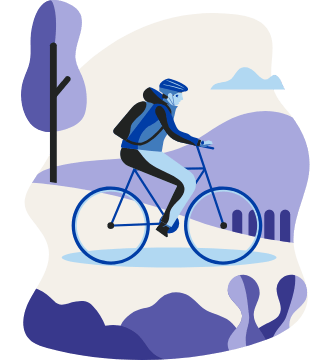It's natural to be concerned...
KAY, Joshua’s mum: I do feel concerned, but maybe that’s more because I’m an overprotective mother than anything! Sometimes I think it’s difficult to let go of the reins and realise Joshua is his own person; it’s about finding a balance between the risk and the benefits.
BAZ, Ross’s dad: The advice from Ross’s healthcare team that stuck with us throughout his younger years, were to always protect his head and to not wrap him up in cotton wool – this gave us the confidence to encourage Ross to try new sports and activities as he was growing up.
CARREEN, Henry’s mum: Being cautious is good, but if you hold your child back too much, they might be nervous about taking part. As long as you investigate it, and you speak to your healthcare professionals to make sure, it should be okay.
MARIA, Ishmael’s mum: I worry about him when he starts a new sport. Sometimes I have to wait, sit tight, and hope for the best. If he does get hurt, he knows and he contacts me.
LESLEY, Paul’s mum: I was concerned when Paul started playing cricket against grown men at 14, bowling 80-90 miles an hour at him! But he’s sensible, he’s protected, he’s padded up. Sometimes I just have to shut my eyes or turn my back.
And sometimes you have to be the bad guy ... or at least compromise
CARREEN: A couple of his friends play rugby, and we’ve always said it’s not any good for him. But he’s very wise in saying, “Okay, as sad as that makes me feel, I can go and do this instead.” He does look at the alternatives himself.
MARIA: At first, I thought rock climbing was a bit too dangerous, but then when you speak to the coaches, you’re reassured…. I’ve overcome those times, and now I let him try any sports he wants to take on.
KAY: He wants to do karate and boxing but I think it would be too much contact and too high risk.
Celebrate the benefits of physical activity
BAZ: I don’t know anyone who is as disciplined as Ross when it comes to doing his stretches before and after exercise, as he knows it allows him to stay active and keep going out on his bike.
MARIA: I’ve seen a great benefit in his confidence, his health. He keeps active, and actually making his muscles stronger makes him have less bleeds. When I saw him coming down from climbing a wall the first time, and the excitement he had on his face, I thought “that’s the best thing ever for him”.
CARREEN: Henry’s got stronger and more confident in doing these things. It’s nice being introduced to other sports, like fencing for example.
KAY: Just having the sense of being part of something has definitely benefited Joshua as well. He’s definitely been more proactive in looking after his joints and his muscles. It’s also helped give him a sense of self-esteem as well, because he looks better on himself as well.
LESLEY: Paul benefits in an awful lot of ways. He’s much stronger physically, which helps him stop having bleeds, but mentally he’s a very different person when he’s on the cricket pitch. He’s very controlled, very adult.
Help them find the right activity for them
LAURA, James’s mum: When I first saw James was scheduled to do tag rugby, I didn’t know how we’d get around it. But his instructors at Cubs and at the rugby club were amazing, and there isn’t full contact because it’s tag rugby. I don’t think he’ll ever be a professional rugby player, but he enjoyed it!
CARREEN: Henry can still go swimming if he has ankle bleeds, because that’s going to be something that won’t put too much pressure on the joint, but at the same time still strengthening the muscles around it. He’s had more serious bleeds, but even then, you try to do something like table tennis to try to keep him active.
Keep the lines of communications open
MARIA: It’s very important to keep up the dialogue with anyone taking care of Ishmael, obviously, and more so if it’s for sports. They don’t need to know everything, just that they need to contact me if he does get hurt.
LAURA: It’s important to keep talking to coaches and teachers. Most of the time his needs aren’t any different to any other child, but sometimes we have to take a little bit more thinking time. But other than that, he’s just like any other boy.
CARREEN: Now I know his football coach very well, so I’m quite happy to leave him there. If he starts a new sporting activity, I’ll make sure I’ll stay around just to make sure each coach is aware, especially if there’s a change of coaches.
KAY: Our haemophilia nurse is very proactive. She goes into the school or any organisation Joshua is part of and talks to anyone who wants to know about the condition.
Get the balance right for you
BAZ: My advice to parents who find out their son has haemophilia, is don’t panic. It’s easier said than done, but just encourage them to stay active and continue taking part in whatever activities they already do, unless the healthcare team advises against it.
LAURA: I think the best advice I can give to any family that’s sceptical about getting involved is to take it slow. Play in the back garden, even catching a ball together. And then if you want to get involved in sport when they’re older, speak to the coaches, speak to the staff that the kids are going to be with to put your mind at rest.
LESLEY: Parents might be hesitant about letting their child do things, but they need to accept that physical activity is really important. Because without parental support, they’re not going to be able to achieve that. They really need their mums and dads on board.



